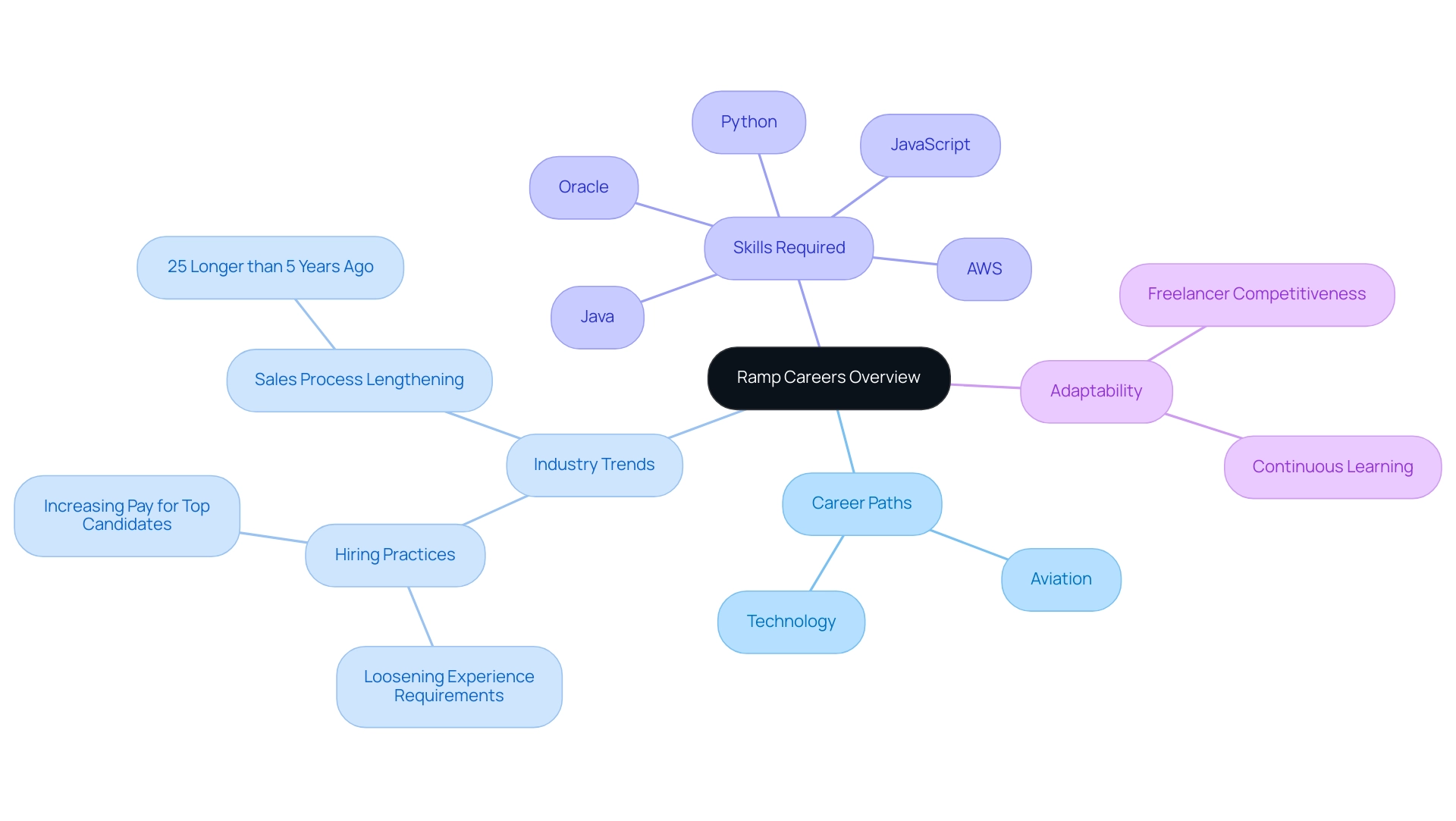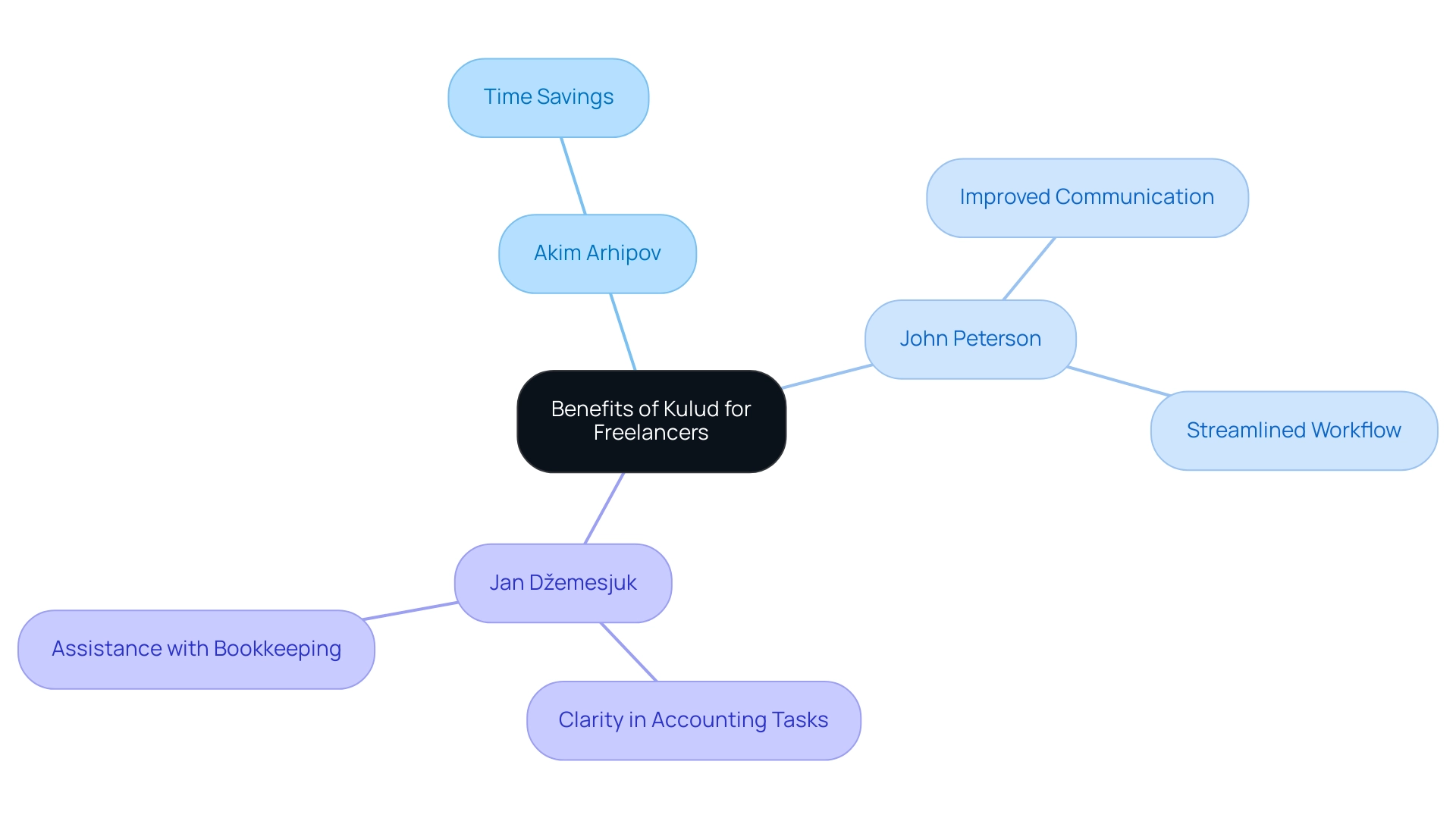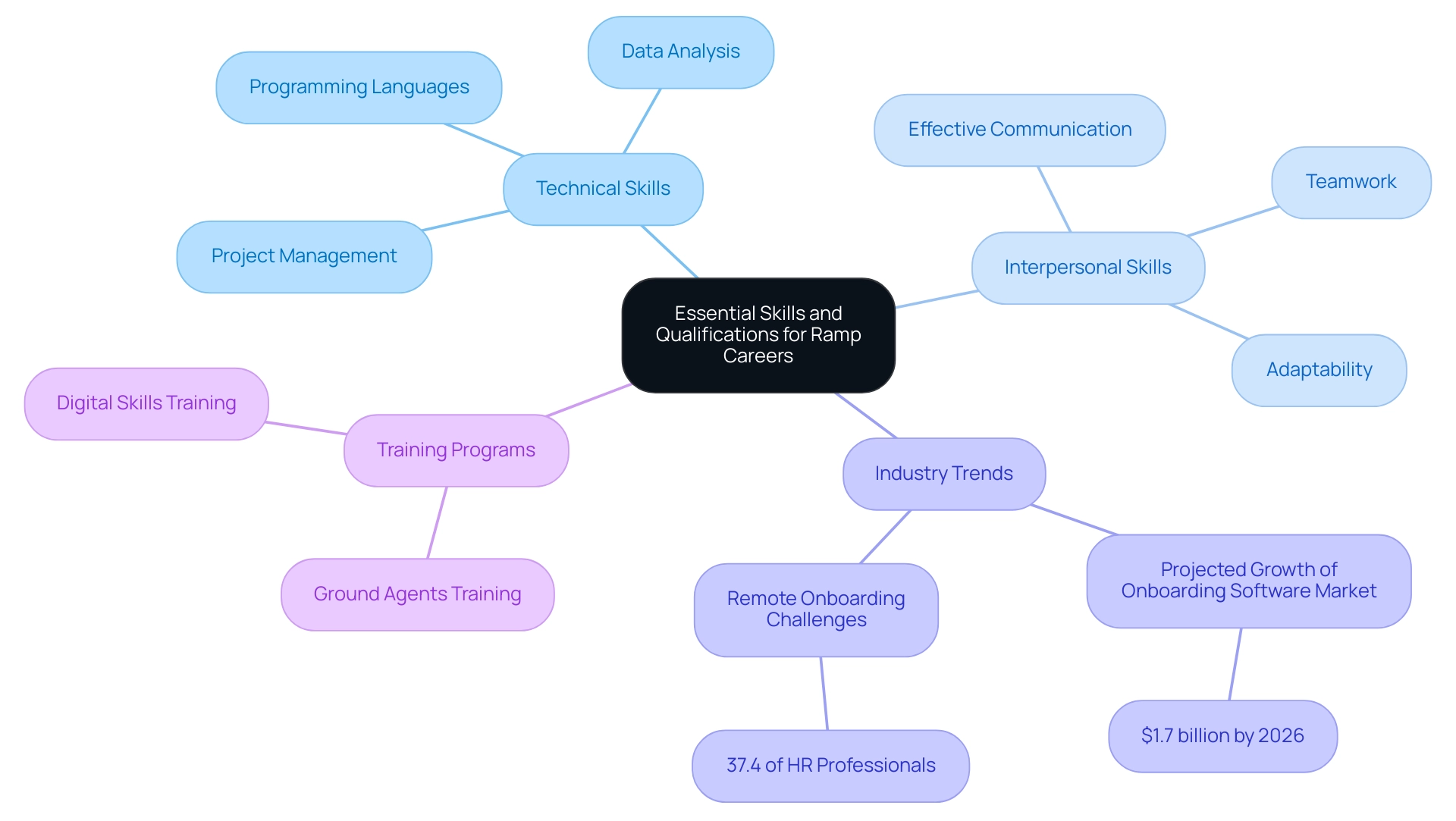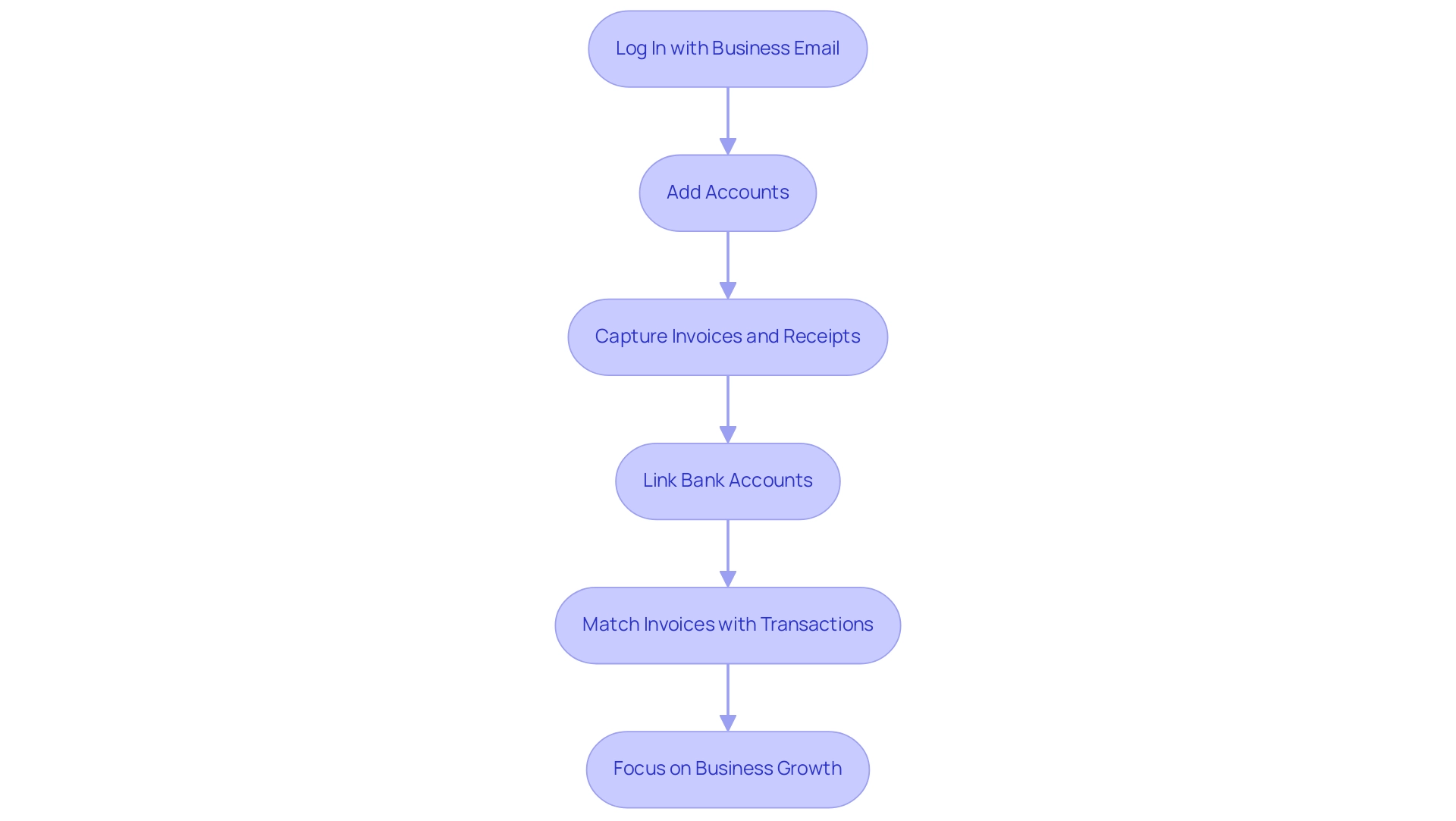Overview
Ramp careers are recognized as transitional job paths that enable individuals to progressively enhance their skills and responsibilities, especially within industries such as aviation and technology. This article highlights how these careers support professional growth and adaptability.
Furthermore, there is a notable shift in hiring practices, with companies increasingly relaxing experience requirements to attract skilled workers. This indicates a strong demand for continuous learning and development in today's competitive job market.
Introduction
In a rapidly evolving job market, Ramp Careers are emerging as a vital pathway for professional growth and skill enhancement. This transitional phase allows individuals to gradually expand their responsibilities and expertise, particularly in sectors like aviation and technology.
As companies adapt to hiring challenges, a significant shift in recruitment practices has been observed; many organizations are lowering experience requirements to attract fresh talent. This trend underscores the importance of adaptability and continuous learning, especially as the demand for specific technical skills, such as programming and data analysis, intensifies.
Furthermore, with innovative tools streamlining processes and enhancing productivity, professionals are increasingly equipped to navigate the complexities of their roles. This means that they are paving the way for career advancement and success in this dynamic landscape.
Defining Ramp Careers: An Overview of Roles and Opportunities
Career paths encompass a diverse array of job opportunities characterized by a transitional phase where individuals progressively enhance their abilities and responsibilities within a new role. This concept is particularly prominent in industries such as aviation and technology, where employees often begin with lower quotas or responsibilities before fully integrating into their positions. In 2025, the job market reflects a notable shift, with 56% of tech managers adjusting their hiring practices by loosening experience requirements to expedite the onboarding process.
This strategic move is indicative of a broader trend aimed at overcoming hiring challenges in a competitive landscape, as highlighted in the Scoring Tech Talent report by CBRE, which found that tech industry hiring is slowing. The significance of ramp careers extends beyond mere job placement; they represent a pathway for professional growth and development. As the demand for skilled workers continues to evolve, adaptability has become a crucial trait for job seekers. In fact, the tech industry has identified Python as the most sought-after expertise in job listings, followed closely by AWS, Oracle, Java, and JavaScript.
This emphasizes the necessity for individuals, particularly freelancers, to continuously update their expertise to remain competitive in the job market. Current statistics reveal that the average B2B sales process has lengthened by 25% compared to five years ago, underscoring the need for professionals who can navigate complex sales environments effectively. This trend emphasizes the importance of adaptability in career paths, as professionals must be equipped to handle the evolving demands of their roles. Furthermore, 93% of remote HR leaders have indicated plans to increase their learning and development budgets, particularly for training technology, reflecting a commitment to fostering talent in a rapidly changing job market.
This is especially significant for freelancers aiming to improve their abilities and stay competitive. Successful shifts into new careers can be observed in various case studies, such as those documented in Robert Half's 2025 salary guide, where individuals have utilized their initial roles to rise to higher positions within their organizations. These examples serve as a testament to the potential for career advancement through strategic skill development and adaptability. As the job market continues to evolve in 2025, understanding the dynamics of ramp careers will be essential for job seekers aiming to capitalize on emerging opportunities.

Exploring Diverse Roles in Ramp Careers
At our company, we understand the common concerns freelancers face regarding expense management. We are proud to share how our platform has transformed the financial management landscape for freelancers and small businesses. Our users have experienced significant time savings and streamlined processes.
Georgi Knyazhev, a freelancer, states, 'Instead of spending 3 hours each month searching for and collecting invoices for my companies in Estonia, I now spend just 5 minutes. It's a huge time saver.'
This sentiment is echoed by John Peterson, Senior Accountant at Bolt, who describes the solution as a 'game-changer for our accounting team,' noting that finding invoices for monthly reports is now effortless and improved communication with business owners has streamlined their workflow.
Furthermore, freelancers like Jan Džemesjuk appreciate the clarity that this service brings to their accounting tasks, stating, 'I just started working as a freelancer, and accounting is a big and confusing task for me.' I am glad that my colleague assists me with a big part of the bookkeeping process.
These testimonials illustrate not only user satisfaction but also the tangible benefits of using Kulud for expense management, such as smart reconciliation and unlimited email processing. This means that our commitment to providing effective solutions for our clients is clear.
We invite you to try our platform and experience the difference for yourself.

Essential Skills and Qualifications for Ramp Careers
To succeed in career paths, candidates must combine technical knowledge with strong interpersonal abilities. Agents, for instance, are required to have physical stamina, meticulous attention to detail, and the capacity to thrive in a fast-paced environment. Conversely, tech roles demand proficiency in programming languages, data analysis, and project management.
Moreover, interpersonal abilities such as effective communication, teamwork, and adaptability are crucial across all Ramp positions. These skills not only enhance collaboration but also foster innovative problem-solving in dynamic work settings.
As the workforce evolves, the significance of these competencies becomes increasingly apparent, particularly in light of the projected $1.7 billion growth in the global onboarding software market by 2026. This underscores the demand for skilled professionals in this area. Additionally, integrating tools like Kulud's automated expense management solution can simplify financial processes for freelancers, ensuring data security through advanced encryption and a completed Cloud Application Security Assessment (CASA) by Google, validated by the App Defense Alliance (ADA).
A recent study highlighted that 37.4% of HR professionals identify remote onboarding as a primary challenge when filling job positions. This statistic emphasizes the necessity for candidates to be proficient in both technical and interpersonal abilities, as these competencies are crucial for navigating the complexities of modern work environments and ensuring career advancement.
Training programs designed for Ground Agents often highlight these essential abilities, equipping candidates to address the requirements of their positions efficiently. As automation and digitization transform the job market, investing in both technical training and interpersonal development will be essential for success in ramp careers. As Georgi Knyazhev remarked, 'The software has changed my accounting methods, enabling me to save time and enhance communication with my accountants,' emphasizing the significance of efficient tools in managing abilities and tasks.
Furthermore, findings from the case study on the digital skills gap in the workforce reveal that a significant portion of the workforce lacks sufficient digital skills. This reinforces the urgent need for reskilling initiatives in this evolving job market. By utilizing secure and efficient solutions, freelancers can better navigate their financial responsibilities while focusing on their core competencies.

Career Advancement and Growth in Ramp Roles
Career advancement in Ramp Careers presents significant opportunities, particularly for freelancers who face challenges in expense management. Many freelancers worry about the time-consuming nature of accounting tasks, which can detract from essential business activities. Fortunately, an automated expense management platform addresses these concerns effectively. This platform allows freelancers to process up to 50 invoices and receipts for free, utilizing smart reconciliation and unlimited email processing to drastically reduce the time spent on accounting tasks—from hours to just minutes. This efficiency enables freelancers to focus on growth opportunities.
Testimonials from users like Georgi Knyazhev illustrate how the platform has transformed their accounting processes. Users report streamlined communication with accountants and a notable enhancement in overall productivity. By automating receipt capture and matching invoices with bank transactions, Kulud empowers freelancers to maintain accurate records, which is crucial for advancing their careers and professional development. For those considering an upgrade, the Pro plan offers processing for 100 invoices and receipts, along with one email box, unlimited exports in CSV, PDF, and ZIP formats, and unlimited email processing. Add-ons are available at €9 for each additional 100 invoices and €3 for each additional connected email box.
Notably, there is no credit card required for the free trial, making it accessible for freelancers to begin using the platform without any commitment.
Statistics indicate that employees who engage in ongoing training and development are 30% more likely to receive promotions compared to those who do not. This underscores the importance of investing in personal growth within the company. Furthermore, case studies demonstrate that individuals who actively pursue professional development in aviation and tech not only enhance their skill sets but also significantly increase their earning potential.
Expert insights suggest that networking and mentorship are crucial for career advancement. Professionals often emphasize the value of building relationships and seeking guidance from experienced colleagues to navigate their career paths effectively.
As the aviation and tech sectors continue to progress, the potential for career advancement remains strong, making Careers in Aviation an appealing choice for those pursuing growth and development. In addition to this, utilizing technology to manage finances effectively can help freelancers maintain a healthy work-life balance, a key factor for long-term success.

The Role of Technology and Automation in Shaping Ramp Careers
The influence of technology and automation on ramp careers is becoming increasingly pronounced, particularly within the aviation and finance sectors. Freelancers often face concerns regarding tedious bookkeeping and expense management. Fortunately, innovative tools like this platform automate these processes, allowing users to focus on strategic, value-added tasks. With features such as automated receipt capture, bank transaction matching, and easy accounting exports, this software significantly reduces the time spent on accounting from hours to mere minutes.
Users can log in with their business email, supported by Gmail, and easily add all their accounts. This functionality enables them to capture invoices and receipts seamlessly, select date ranges, or turn on automatic search for efficiency. By linking their bank accounts, the platform matches invoices with transactions, simplifying the process for exporting VAT or annual reports. This means that users can concentrate on business growth while maintaining accurate financial records, illustrating the direct benefits of Kulud’s platform in the context of ramp careers.
Furthermore, advancements in ground handling technology in aviation are revolutionizing operational efficiency and safety protocols, further supporting ramp careers. These technological advancements not only improve current roles but also create new job opportunities that require diverse competencies. As automation progresses, it is vital for job seekers to remain alert to industry trends and the competencies that will be in demand.
Statistics indicate that 86% of consumers are more likely to engage with brands that personalize their digital experiences, underscoring the importance of technology in shaping user interactions across sectors. The platform personalizes the user experience through its automation capabilities, making customer onboarding a pivotal aspect of customer experience strategies in 2025. The capability to utilize technology efficiently will be a crucial differentiator for experts in careers, with the company enhancing customer interactions through streamlined processes.
Case studies indicate that organizations increasingly acknowledge the necessity to adjust to a globalized economy, where skill gaps and the emergence of Big Tech necessitate a reassessment of workforce strategies. This trend highlights the necessity for freelancers and professionals to embrace continuous learning and adaptability in their careers. The slowing hiring trends in the tech industry, as noted by CBRE, further emphasize the importance of adapting to technological advancements in ramp careers. Overall, the impact of technology and automation on ramp careers is profound, creating a landscape where efficiency and strategic focus are paramount.
As automation tools like Kulud streamline processes, they enhance operational capabilities and redefine the roles and responsibilities of freelancers and professionals in these dynamic sectors. We encourage you to explore this platform and experience the benefits it offers firsthand.

Conclusion
The exploration of Ramp Careers reveals a transformative approach to professional development in an ever-evolving job market. As industries like aviation and technology adapt to new challenges, the concept of Ramp Careers provides a structured pathway for individuals to enhance their skills and responsibilities progressively. This shift, characterized by relaxed experience requirements and a focus on adaptability, underscores the importance of continuous learning and the acquisition of in-demand technical skills.
Furthermore, the integration of innovative tools, such as Kulud, demonstrates how technology can streamline processes and enhance productivity for freelancers and professionals alike. By automating tedious tasks like expense management, these platforms empower users to focus on strategic growth opportunities, ultimately facilitating career advancement. The testimonials from satisfied users highlight the tangible benefits of leveraging such technologies, illustrating the critical role they play in navigating the complexities of modern work environments.
In addition to this, the emphasis on essential skills—both technical and interpersonal—remains paramount in Ramp Careers. As organizations increasingly prioritize adaptability and effective communication, candidates equipped with these competencies will be better positioned to thrive. The projected growth in onboarding software and the need for skilled professionals further reinforce the necessity of investing in personal and professional development.
In summary, Ramp Careers not only represent a viable pathway to career advancement but also highlight the importance of embracing change and innovation in the workplace. As professionals navigate this dynamic landscape, the commitment to continuous improvement and the strategic use of technology will be key to unlocking new opportunities and achieving long-term success.



